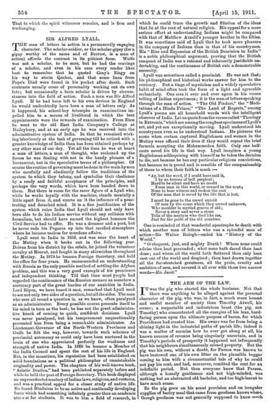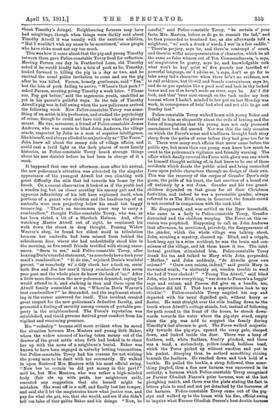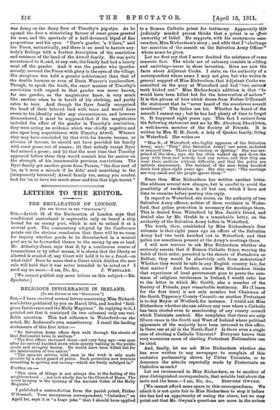THE ARM OF THE LAW.
IT was the pig who started the whole business. Not that there was anything to be alleged against the personal character of the pig, who was, in fact, a much more honest and useful member of society than Timothy Atwell, his owner; a respectable and industrious beast (the pig, not Timothy) who concentrated all the energies of his lean, hard- faring person upon the ultimate purpose of bacon, for which Providence had created him. His owner was far from being a shining light in the industrial paths of parish life; indeed it was a matter of surmise how he ever got along at all, his known sources of revenue being singularly uncertain, and in Timothy's periods of prosperity it happened not infrequently that his neighbours simultaneously missed property. But the pig was his own, without a doubt, for Parson was known to have bestowed one of his own litter on the plausible beggar coming to him with a circumstantial tale of why he could not pay his rent, and had, moreover, remitted the rent for an indefinite period. But then everyone knew that Parson, although a homely gentleman and not high-minded, was nothing but an abstracted old bachelor, and too high-learnt to have much sense.
So the pig grew on his scant provision and on irregular supplies of barley meal that came from goodness knows where, though goodness was not generally supposed to know Tnue.h
about Timothy's doings). Neighbouring farmers may have had misgivings, though when things were darkly said about Timothy Atwell it was usually with the cautious addition, " But I wouldn't wish my name to be mentioned," since people who have ricks must not say too much.
This was how it came about that the pig and young Timothy between them gave Police-constable Tovey food for reflection. Meeting Parson one day in Featherbed Lane, old Timothy asked if he would kindly take a loin of pork as he, Timothy, looked forward to killing the pig in a clay or two, and he omitted the usual polite invitation to come and see the pig after he was killed. Parson, homely gentleman, said "Yes," but the loin of pork failing to arrive, " Where's that pork ? " asked Parson, meeting young Timothy a week later. " Please zur, Peg got better," said the ingenuous youth, unskilled as yet in his parent's guileful ways. So the tale of Timothy Atwell's pig was in full swing when the new policeman arrived the following week. Now Police-constable Tovey was some- thing of an artist in his profession, and studied the psychology of crime, though he could not have told you what the phrase meant. He was, moreover, a friend of Police-constable James Andrews, who was cousin to blind John Andrews, the village oracle, respected by John as a man of superior intelligence, like himself, and always alluded to majestically as" The Force." John knew all about the seamy side of village affairs, and could cast a lurid light on the dark places of most family histories, so Police-constable Tovey heard strange things about his new district before he had been in charge of it a week.
It happened that one wet afternoon, soon after his arrival, the new policeman's attention was attracted by the singular appearance of the youngest Atwell but two climbing with great difficulty the stile that led towards his home by the brook. On a casual observation it looked as if the youth had a wooden leg, but on closer scrutiny his uneasy gait and the apparent inflexibility of his left knee explained itself, when portions of a gaunt wire skeleton and the headless top of an umbrella were seen projecting below his small but baggy trouser-leg. " That's an uncommon queer way to carry a ramberellow," thought Police-constable Tovey, who was, as has been stated, a bit of a. Sherlock Holmes. And, after watching Master Atwell out of sight, he continued his walk down the street in deep thought. Passing Widow Weaver's shop, he found her eldest maid in tribulation because her umbrella bad been missed from behind the schoolroom door, where she had undoubtedly stood him in the morning, as five small friends testified with strong assur- ances. "Seem to me," said Police-constable Tovey, after hearing Doris's tearful statement, "as somebody hey a-took your maid's rumberellow." "It do zim," rejoined Doris's wrathful parent, "as somebody wi a tidy cheek hey a-took en, seein' both Ben and Joe hey carr'd thicey rumberellow this seven year past and the whole place do know the look of 'un." After a little more discussion the new policeman departed, saying he would attend to it, and stalking in then and there upon the Atwell family assembled at tea, " Where'm Doris Weaver's best rumberellow ? " he demanded, and the implement stand- ing in the corner answered for itself. This incident created great respect for the new policeman's deductive faculty, and promoted a feeling of security among owners of portable pro- perty in the neighbourhood. The Force's reputation was established, and timid persons derived great comfort from his vigilant and reassuring presence.
His " redeship " became still more evident when he saved the situation between Mrs. Masters and young Seth Baker, whom the widow accused of having taken money out of the drawer of the great settle when Seth had looked in to cheer her up with the news of a neighbour's burial. Baker was known to have been engaged in unlucky betting transactions, but Police-constable Tovey had his reasons for not wishing the young man to be dealt with too summarily. He walked in upon flustered Mrs. Masters with his most official swing, "Now bee 'ee certain 'ee did put money in thic part?" said he, but Mrs. Masters, who was rather a high.minded body (fair ate up with pride, her neighbours said), resented any suggestion that she herself might be mistaken. She went of in a miff, and finally lost her temper, and said she'd let the magistrates know what justice was, and pay for what she got, too, that she would, and see if she didn't tell 'em tales of that gallus Baker and his doings. " Now, be careful," said Police-constable Tovey, " be certain o' your facts, Mrs. Masters, before ee do go to commit the lad," and he then proceeded to bombard her, as she afterwards told a, neighbour, "wi' such a drouk o' words, I wer' in a fair coddle." " There 'm perjury, says he, and there'm contempt o' court, and there'm wilful misrepresentation o' character, which be all the same as false witness out of Ten Commandments, 'a says, an' magistrates be gentry, says he, and knowledgable yolk what won't be kep' quiet wi' five pounds nor terrified we powerful language, an' I advise ee, 'a says, don't ee go for to take away lad's character when there be'n't no evidence, not to call evidence, but ill-will and female contrairiness, says he, and do ee goo upstairs like a good soul and look in thy locked boxes and see if ee hevn't made an error, says he. An' I did look, and ther"twer sure enough on the tack under my best bonnet where I hadn't minded to hey put en last Monday was week, in consequence of bein' bad abed and not able to go out Sunday last."
Police-constable Tovey walked home with young Baker and talked to him so eloquently about the evils of betting and the force of temptation that the young man not only promised amendment but did amend. Nor was this the only occasion on which the Force's sense and kindliness brought back stray sheep from the paths of error before they had gone too far in it. There were many such affairs that never came before the public eye, but more than one young man knew how much he owed to the policeman's vigilance and friendly warning. The affair which finally covered the Force with glory was one which he himself thought nothing of, in fact knew to be one of those accidents which dazzle the public mind and bring unmerited fame upon public characters through no design of their own. This was the recovery of the corpse of Granfer Dyer's only goose, the pride of his heart, the last survivor of a brood cut off untimely by a wet June. Granfer and his two grand- children depended on that goose for all their Christmas festivities, and indeed he was a personable gander, always referred to as The Bird, since, in Somerset, the female crowd is not counted in comparison with the cook-bird.
He disappeared, and woe settled on the Dyer household, who came in a body to Police-constable Tovey, Granfer distracted and the children weeping. The Force on this oc- casion was perplexed. Happening to call on John Andrews that afternoon, he mentioned, privately, the disappearance of the gander, which the whole village was talking about. John, scenting a mystery, cheered up. Blind, and a cripple, hurt long ago in a mine accident, he was the brain and con- science of the village, and let them know it too. The intel- lectual problem stimulated him. Police-constable Tovey drank his tea and talked to Mary while John perpended. " Mother," said John suddenly, "do Atwells grow own onions P " " Grow own onions, indeed," said gentle Mary in unwonted wrath, "a slatternly set, wooden trouble to weed the bed if 'twer choked ! " "Young Tim Atwell," said blind John, who knows everything, "wer down to Passon's a-beggin' sage and onions, and Pasoan did give en a bundle, too, Gardener did tell I. That have a superstitious look to my thinkin'." Police-constable Tovey emptied his cup and departed with his usual dignified gait, without hurry or fluster. He went straight over the stile leading down to the brook where Atwell's cottage stands, but, instead of following the path round to the front of the house, he struck down- wards towards the water where the pig-stye stood, empty since the pig was sold to support the family during Timothy's last absence in gaoL The Force walked majestic- ally towards the pig-stye, opened the crazy gate, stooped down, and looked inside the door. There was a heap of feathers, soft, white feathers, freshly plucked, and there was a head, a melancholy, yellow-beaked, bodiless head, which the Force picked up without emotion and put in his pocket. Stooping thus, he noticed something shining beneath the feathers. He reached down and took hold of a buckle. He pulled the buckle, a strap followed, then some- thing jingled, then a. fine new harness was uncovered in its entirety, a harness which Police-constable Tovey recognised as Farmer Obadiah Pearce's prize harness, won at the last ploughing match, and there was the plate stating the fact in letters plain to read and not yet detached by the borrower of the harness. Police-constable Tovey came out of the pig- stye and walked up to the house with his fine, official swing to inquire what Farmer Obadiah Pearce's best double harness was doing on the damp floor of Timothy's pig-stye. As he opened the door a stimulating flavour of roast goose greeted his nose, and the spectacle of a half-devoured biped of fine proportions met his eyes. "Dyer's gander, 'a b'lieve," said the Force, sarcastically, and there is no need to harrow any- body's feelings with a further description of the conviction and sentence of the head of the Atwell family. He was quite accustomed to it, and, at any rate, the family had had a hearty meal off the gander. And it was the gander who (posthu- mously) covered the Force with glory in the eyes of the village. His recapture was held a greater achievement than that of the double harness or even of Doris Weaver's ramberellow. Though, to speak the truth, the exact manner of Timothy's conviction with regard to that gander was never known, for one gander, as the magistrates knew, is very much like another when he is bereft of his clothing, and partly eaten to boot. And though the Dyer family recognised the head of their beloved bird with tears and would have sworn to his identity under any circumstances, and however dismembered, it must be supposed that if the magistrates included the affair of the gander in Timothy's conviction, they were acting on evidence which was chiefly negative and also upon long acquaintance with Timothy Atwell. Whence they may have concluded (a) that with his known income, or absence of income, he should not have provided his family with roast goose out of season ; (b) that nobody except Dyer had missed a goose ; and (c) that the next time that Timothy appeared before them they would commit him for assizes on the strength of his innumerable previous convictions. The Dyer family got another goose from Parson, "the dear soul of 'en, as 't were a miracle if he didn' send something to the [temporarily bereaved] Atwell family too, seeing you couden look for 'en to have too much sense and him that high-learnt."






































 Previous page
Previous page